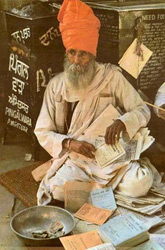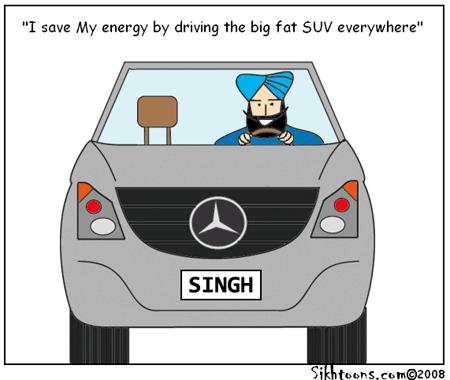Pavan guru paani pita, maata dhart mahat ...
Air is our teacher, Water our father, And the Great Earth our mother ...
[Guru Nanak, Japji, Epilogue]
 While the governments of the world move at a snail's pace in solving the energy crisis, a grassroots movement at the consumer level can turn the tide around. It is just a matter of realization, consciousness, and making some lifestyle changes. It is starting to happen around the world. It is significant and it is the only thing we can do right now.
While the governments of the world move at a snail's pace in solving the energy crisis, a grassroots movement at the consumer level can turn the tide around. It is just a matter of realization, consciousness, and making some lifestyle changes. It is starting to happen around the world. It is significant and it is the only thing we can do right now.
It is very simple: Reduce the demand on Energy!
It pains me to see how well-off Sikhs (and South Asians in general) in both the East and the West are so complacent over one of the biggest crises in the world right now. We have not shown any concern (unless it affects our pockets), and little leadership and vision in this area.
Addicted to cheap supplies from the third world, driving the biggest gas guzzlers, buying huge houses that ultimately end up owning us, and stuffing the landfills with disposables, we show our affluence by hogging the energy, trashing the environment ... and taking a lot of pride while at it.
I hate to start this article by blasting ourselves, but I think you will appreciate where I am coming from if you read on.
Recently, I found myself on a long drive with a few teens. Being the tree hugger and all that I am, I wanted to use the time en route in a useful discussion on the environmental degradation and our responsibility as Sikhs.
I am ashamed to say that I was totally unsuccessful.
With all due respect to their good behaviour otherwise, they were absolutely not interested in such an important issue; and mind you, I was not lecturing. I was listening and trying to create a dialogue, but all they had to offer was their enthusiasm about the 12-cylinder Ferrari their relative bought, or the 10-bedroom beachfront pool house their friend owns.
When I brought up the point that global warming is not so far out and that it is affecting our lives every day, one of them mentioned that her family had a large mansion in India they can go to if something like the wildfires got to them. (Great job, parents!)
Even though my ears started hurting from all the materialistic chatter, I didn't give up. As a last resort, I told them that they could only speak if they talked about Sikhi values, benevolence or taking care of Mother Earth.
Well, there was total silence for the next ten minutes, and then one of them spoke up: "There are these organic jeans at the Gap for a hundred and eighty dollars that are so cool.....!" Now that you understand where I am coming from, let us get to the point.
Now that you understand where I am coming from, let us get to the point.
Common sense change at the grassroots level will reverse the energy crisis, and the environmental crisis. And I expect and hope that Sikhs around the world will not only be a part of that change, but be the very leaders.
Why?
Because it is fundamental to our faith and tradition. Our faith is a green faith. Earth is designated as our physical Mother in Gurbani and we have the obligation to take care of it. We have the duty to leave a better world for our next generations.
I derive my inspiration from the great environmentalists like the late Bhagat Puran Singh (photo left) who spent all his life lobbying and caring for the environment (and yes, looking after the disabled).
I first came across his extraordinary writings on the desertification of Punjab when I was young. His volunteers handed me a recycled paper pamphlet that talked about it all, as we walked out of Darbar Sahib.
While most of those were used by people to wrap around left-over Parshad or to wipe hands, I saved mine and asked my Dad to read it for me. I still remember all the words uttered ... The rivers are being poisoned ... The land is becoming a desert ... We need to live simply, and we need to plant trees if we are to save our future ...
Gurbani stresses, over and over again, that we lead simple lives by, for example, consuming less.
And today that message is so relevant. Reducing the demand at the consumer level is the best way to solve the global crisis of energy and the environment.
I am citing some changes that we have easily incorporated in our lives at home, in order to reduce our energy footprint. Please take what you can and think of your own creative ways that work for you.
Be the change, and spread it forward.
-
We have taped shut our clothes dryer. With so much solar heat outside, the line drying of clothes is working just fine. It also allows us to breathe fresh air and smell the roses while we fold our laundry in the backyard. It's one of the simplest ways of using the alternative energy resources directly and reducing the dependence on fossil fuels. Energy savings - 20%.
-
By planting trees around the house, we have developed a mature shade-giving canopy over the years. The temperature underneath the shade is 15-20 degrees cooler than the ambience. Who needs the air conditioner ? We open the windows in the night when the temperatures are low and let the house cool. In the morning, we shut windows, pull the shades, and enjoy the moderately cool house. Energy savings - 20%.
-
 We drive less. I have managed telecommuting from home for a few days out of the month and repay my employer by working for an extra hour those days. (With the saving in drive time, that is an easy thing to do.) By making simple changes in driving habits such as car pooling, reduced speeds and accelerations, well-inflated tires and clean air filters, 10% to 30% of fuel consumption can be saved. The national gas bills may have gone up, but ours have gone down.
We drive less. I have managed telecommuting from home for a few days out of the month and repay my employer by working for an extra hour those days. (With the saving in drive time, that is an easy thing to do.) By making simple changes in driving habits such as car pooling, reduced speeds and accelerations, well-inflated tires and clean air filters, 10% to 30% of fuel consumption can be saved. The national gas bills may have gone up, but ours have gone down.
-
Once or twice a week, I walk to the grocery store for eco-shopping trips. First, I get my exercise and second I do my shopping. I don't understand the idea of using energy to burn energy; i.e. driving to the gym or using a treadmill or both.
-
We have literally stopped visiting shopping malls unless we must have something that's not available online. It used to be that I would go to malls and buy things I absolutely didn't set out for. We have saved thousands - YES, thousands of dollars in the last three years from spurious shopping. That takes care of dasvandh right there and leaves us with more time and money to invest into greening and other community projects.
-
We try to buy locally manufactured goods even if we have to pay extra. There are hidden costs of shipping involved with buying cheap imported goods. Shipping overseas pollutes environment, kills wildlife, and is bad for the local economies. Here, the savings may not show up in our account, but they help the world energy supplies and local economy.
-
Weddings, birthdays, graduations? We give one of these things: spiritual, educational, local handicraft items or plants. It saves on a lot of headaches, time and driving around while enriching the loved ones and the environment.
-
With all the conservation mania, you would wonder if we ever have any fun in our lives. You bet, we do. Ever heard of eco-vacations ? We hike, kayak, swim, sail and snorkel at nearby destinations. We have tent-camped for over ten years in the most pristine state and national parks in the U.S., but never once have we run into another Sikh family having eco-fun. (Too busy visiting international shopping destinations ?) Reduced flying and forgoing of expensive resorts results in energy savings of over 75%.
You probably have read about all the simple changes we have made in our kitchen. [If not, you can read them here.]
My neighbour was shocked the other day when we compared our energy bills. We consume less than 50% of the energy and water they do. We have the same size houses and yes, we do shower every day. With all the savings in energy costs, we can afford to eat healthier, local and organic foods.
We made all these changes gradually, so they were not as hard to make as one might think. Over time, they have become our lifestyle. We keep looking for new ways to contribute to the reversal of global warming. The most important thing is awareness and the feeling of responsibility.
Also, what helps is that we are not ashamed to be called conservationists. We are proud of it. Carrying our water in reusable glass jars, toting our cloth shopping bags, are statements we love to make. "Reducing, Reusing and Recycling" is the mantra we are more than happy to share with the world. Sometimes we get called "poor" or "cheap" in the affluent circles, and we just smile.
How else will this become a grassroots movement if we were not to pour out our passion, overcome false pride, and educate and inspire the world with all we have?
"Never doubt that a small group of thoughtful, committed citizens can change the world. Indeed, it's the only thing that ever has". [Margaret Mead]
[For more by Gurmeet Kaur, please check out: http://greengurmeet.blogspot.com/; for The Conscious Kitchen ]
